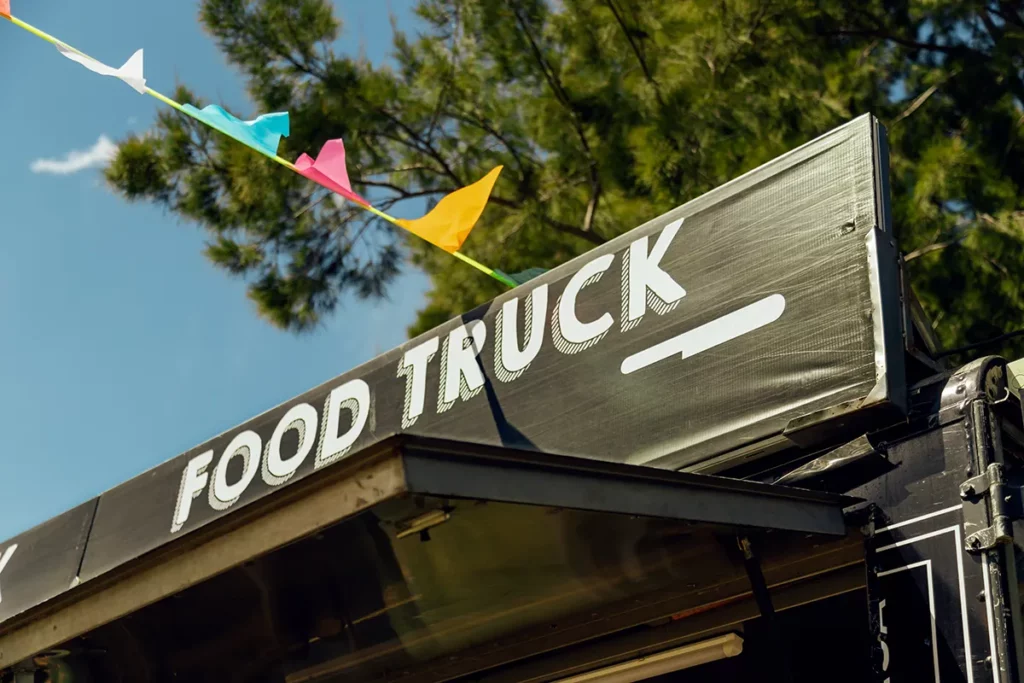Starting a Texas food truck business involves meeting state and local requirements, obtaining necessary permits and licenses, and safeguarding your business with food truck insurance. All in all, you could spend several months to a little over a year getting set up.
If you’re ready to share your specialty dishes with fellow Texans, we’ve got you covered. Our handy guide covers all the essentials: laying the foundation for your business, meeting legal requirements, and protecting your operations so you can hit the road with confidence!
Requirements for a Food Truck in Texas
Prior to applying for the licenses and permits you need to open a food truck in Texas, you must obtain the following:
- Business name: Your food truck needs a memorable name that tells customers who you are and what you sell.
- Employer identification number (EIN): Also known as the federal Tax Identification Number, this nine-digit number is unique to your business and is issued by the IRS for tax purposes.
- Business classification: This determines how much you pay in taxes, how your business structure is organized, your personal liability if things go wrong, etc.
- Certificate of Insurance (COI): Food truck rallies, festivals, and other events will require you to provide a COI before accepting your vendor application. This document proves you have adequate insurance coverage for your business.
- Business plan: Your business plan lays the foundation for your food truck business. Banks and other lenders will ask to see it before issuing you a loan.
- Business registration: Texas does not require a general business license, unlike many other states. Instead, register your business online with the Secretary of State and use the document you receive in place of a business license when asked to provide one (e.g., applying for a federal business loan).
Texas Food Truck Licenses and Permits
Texas requires a number of licenses and permits for food truck businesses to operate legally. The process can take several months to a year to complete, so give yourself plenty of time to acquire them all.
Don’t forget that many regulations for businesses in Texas vary depending on your city or county. Whether you’re opening a tamale truck in Tyler or a pizza truck in El Paso, always check with your local government to be sure you are complying with their requirements.
- Authorizes you to charge and collect state and local sales tax on your products. You need to acquire this prior to applying for a mobile food unit (MFU) permit.
- Cost: $0
- Where to get it: Texas Comptroller’s Office
- Allows you to legally operate a mobile food business in Texas.
- Cost: $258 (+$125 for optional amendments)
- Where to get it: Texas Department of State Health Services
- Certifies that you and your employee(s) passed a course on food safety and handling best practices, and permits them to prepare and serve food in Texas.
- Cost: As low as $7.99 per employee
- Where to get it: Texas Food Handler’s Training
- Texas law requires at least one manager at a food establishment to carry certification as a food manager. Anyone with this certification does not need a food handler’s permit.
- Cost: $35
- Where to get it: Texas Food Manager Certification
- Certifies that your food truck meets your local health and safety standards.
- Cost: Usually between $100–$1,000+
- Where to get it: Apply with your local health department
- License for driving your food truck.
- Cost: $97 for most food trucks
- Where to get it: Texas Department of Public Safety

Food Truck Laws in Texas
Texas has many laws governing mobile food units to make sure businesses like food trucks operate safely and legally.
Here are just a few laws you should be aware of:
- Central Preparation Facility (CPF) requirement: Some cities and counties require food trucks to use a registered CPF, or commissary kitchen, to store ingredients and supplies, and serve as a base for all food preparation. Check with the local government to see if this applies to you.
- Liquor licenses: The Texas Alcoholic Beverage Commission (TABC) will not issue a liquor license for a food truck in Texas. These licenses are only given to businesses with a certified permanent physical address, so selling alcohol from your food truck can’t be part of your business plan.
- Waste disposal: Cities and counties have their own waste management regulations you must follow, such as restrictions for grease or cooking oil disposal.
Compliance with labor laws: Your food truck operation must adhere to labor laws. Keep up with federal labor regulations for food businesses and Texas employment laws to avoid violations. - Regular health inspections: Texas food trucks are subject to regular inspections to ensure they don’t pose a threat to public health, just like brick-and-mortar restaurants. Failure to pass an inspection could result in a fine, loss of revenue, or getting shut down.
Food Truck Insurance in Texas
Beyond needing vehicle insurance, food trucks also need a comprehensive liability policy. Food Liability Insurance Program (FLIP) offers Texas food business insurance designed to cover common claims and meet insurance requirements mandated by festivals, commissary kitchens, and more.
If a customer gets sick from something you served them or slips on a grease spill outside of your food truck, food business insurance can cover the expenses you would otherwise pay out of pocket. This includes medical bills, property damage, and defense fees if you have to go to court.
Cost of Running a Food Truck in Texas
While licensing and insurance costs are important to factor into your budget, there are many other standard expenses to account for, including:
- Food truck
- New: $75,000–$200,000
- Used: $35,000–$80,000
- Cooking equipment
- Grill/griddle: $1,000–$5,000 depending on size and brand
- Deep fryer: $500–$3,000
- Oven: $2,000–$10,000 depending on size and brand
- Refrigeration
- Refrigerator/freezer: $1,000–$4,000
- Prep table: $1,500–$3,000
- Safety and sanitation
- Commercial sink: $500–$2,000
- Handwashing sink: $200–$1,000
- Fire suppression system: $3,000–$6,000
- Technology
- Point of Sale (POS) system: $500–$1,500
- Inventory management software: $20–$50 per month
Another major expense you need to consider is how much you pay for ingredients. Factors like global shortages, supply chain disruptions, and seasonality all influence your food expenses.
Pick a strong pricing strategy that covers your standard operating expenses, stays competitive with other food trucks in your area, and ensures you make a profit.

Texas Food Truck Festivals
Texas is home to a lively food festival circuit ready for you to take part in once your food truck business is set up!
Some of the top food truck festivals in the Lone Star State are:
- The Texas Food Truck Showdown
- Trucksgiving
- Texas Street Food Festival
- The Food Truck Championship of Texas
Don’t forget that food truck permits in Texas vary depending on the city or county. so make sure you check what’s required in each festival location and follow our guide to getting your food truck into events near you!
FAQs About Requirements for a Food Truck in Texas
Can I Park My Food Truck Anywhere in Texas?
No, you must comply with the zoning and parking regulations of the city you operate in. Before parking, check city ordinances for:
- Rules around obstructing traffic or pedestrian walkways
- Time limits dictating how long your truck can be parked in one place
- Zoning restrictions for parking on private property
- Proximity to schools or brick-and-mortar restaurants
- Whether a parking permit is required by the city or county you’re operating in
Is a Commissary Kitchen Required for Texas Food Trucks?
In some parts of Texas, it’s mandatory for food truck businesses to use a commercial kitchen where the bulk of food storage, preparation, and dishwashing takes place. This is referred to as the Central Preparation Facility (CPF).
Check with your city’s health department to see if you need a CPF for your food truck. Then read up on commercial kitchen requirements to help you find the perfect place to rent.
What Are the Fire Safety Requirements for Food Trucks in Texas?
Most local government fire safety regulations require food trucks to install fire suppression systems, such as automatic fire extinguishers. You’ll also be subject to regular inspections to ensure you meet safety standards, and some jurisdictions require you and your staff to practice routine safety drills.

Reviewed by: Kyle Jude
Kyle Jude is the Program Manager for Food Liability Insurance Program (FLIP). As a dedicated program manager with 10+ years of experience in the insurance industry, Kyle offers insight into different coverages for food and beverage business professionals who are looking to navigate business liability insurance.

By Alex Hastings
Alex is a Marketing Copywriter at Food Liability Insurance Program (FLIP). In her free time, she enjoys reading, birding, traveling, and finding any excuse to get brunch.


